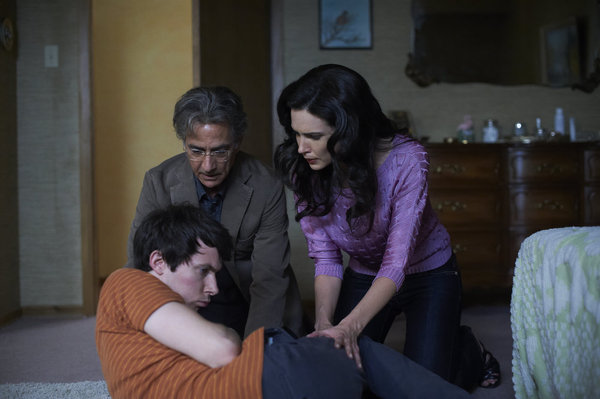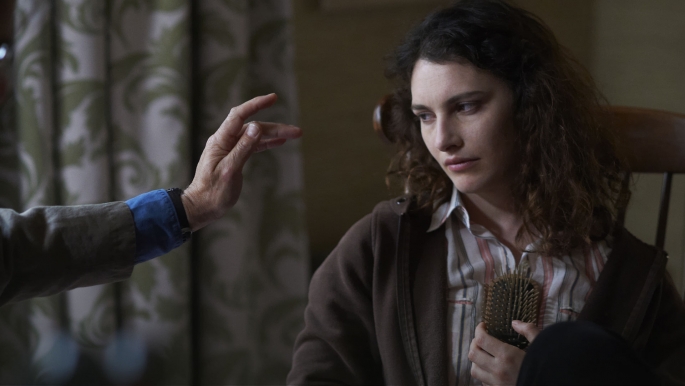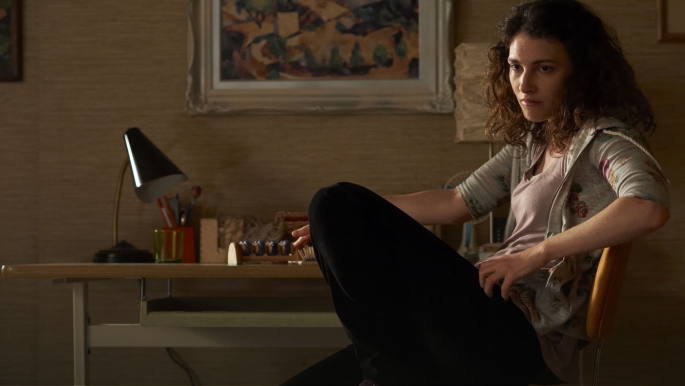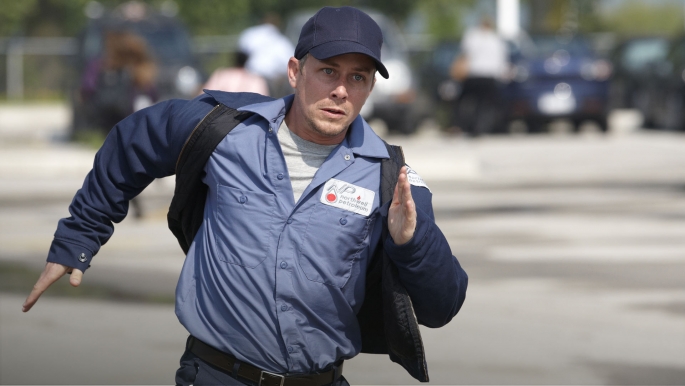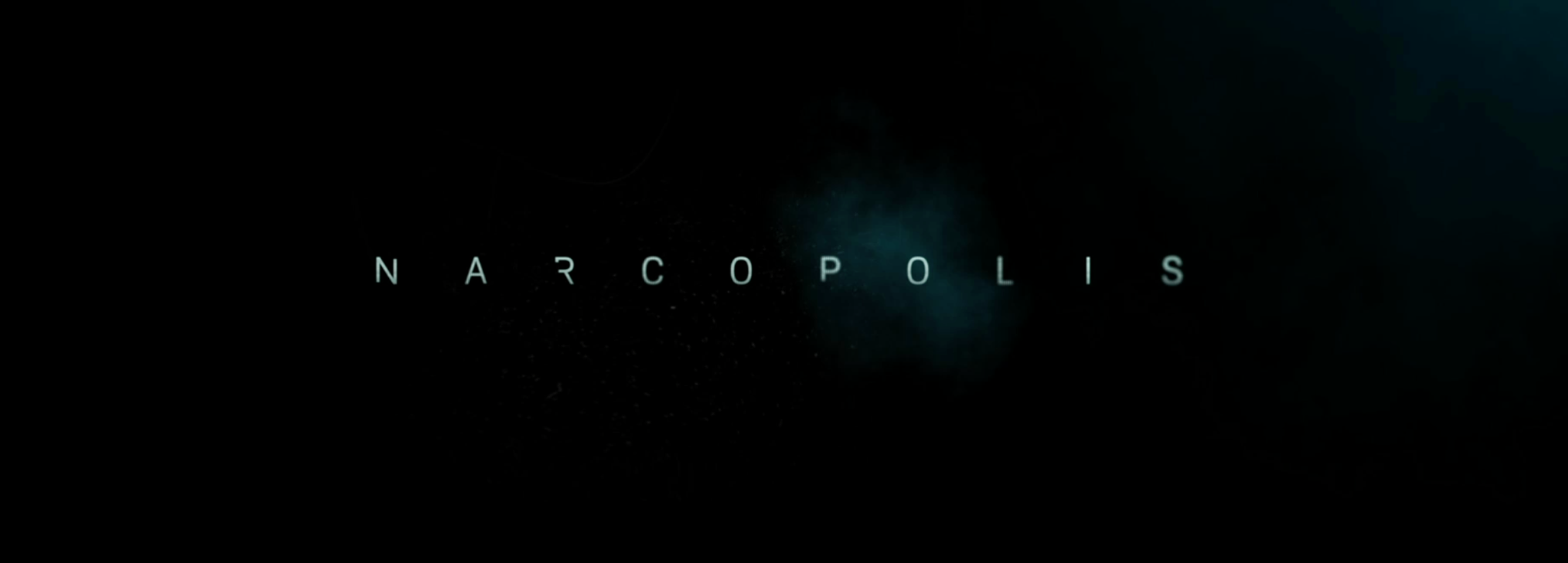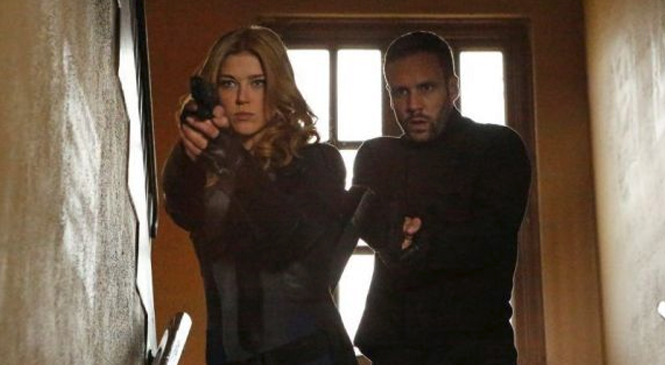ALPHAS 01.04 – Mr. Harvey Sees Red Flags
 “ROSETTA”
“ROSETTA”
Some SPOILERS FOLLOW.
While Gary brushes his teeth and prepares for bed, he comes across a signal and says “Gotcha.”
In a house in the suburbs, two men prepare food, oblivious to the DOD special operations team moving into position around them. Inside the mobile command center, Rachel uses her enhanced hearing to detect the presence of a third person inside the house, one of them Milos Kosar, the man responsible for sending the Ghost after Rosen. Agent Sullivan asks Rosen if his people are ready, and we see Hicks and Bill with the OPS team preparing for the assault. Rosen gives the order and Bill triggers his fight-or-flight response and charges a door while Hicks uses his abilities to shoot the hinges off another. But inside the house, one of the targets Alpha abilities has warned him that they have company, and as the assault team enters there is a power surge that disrupts the team’s communications and enables Kosar and his friend with the early warning abilities to slip away.
Investigating the house the Alphas and the DOD find a treasure trove of Red Flag data, and the owner of the house, an autistic woman named Anna. Determining that Anna was a prisoner in her own home, Rosen leaves Gary at the house with Nina and some agents to check for more signals while the rest of the team heads back to the office to examine the data. And while Nina is less than thrilled with playing babysitter for Gary, he finds something remarkable about Anna: she understands everything.
She’s an Alpha herself, her mind capable of understanding any language, but trapped in a body that cannot communicate thru normal means. What she CAN do and does, is create a language of her own, which Red Flag has been using to encrypt their communications. Using a captured tablet computer, Gary and Anna are able to speak through the voice software, and Anna agrees to help them find Kosar.
But Anna isn’t quite what she seems, and who and what she is, well… That this episode focuses on Gary and Anna is important, for the secrets Anna holds and the unfolding truth about Red Flag are not exactly what we expect.
Spoilers.
Oooooohh. Well this is interesting.
Anna is Red Flag. She’s the person calling the shots and running EVERYTHING. And exactly what Red Flag is, is much less the criminal organization Rosen and the DOD have been thinking and much more a group of Alphas who recognize that their abilities are outside the norm and aware of what happens all to often to those who are perceived as different. Banding together and offering a network of support to those with unique abilities, Red Flag sees themselves as defending Alphas against a world that fears them. They’re not a criminal enterprise, they are believers in a cause, which makes them far more dangerous. That their cause is understandable is especially interesting, more so with the growing questions about how the DOD is dealing with the Alphas at Binghamton. Human history is filled with bad things being done to The Other by “normal” society, and to think that those whose abilities are beyond normal human reach would be treated with fear and suspicion is pretty damn logical.
Giving Red Flag a reason for their actions, one we can understand and even perhaps sympathize with is smart really. Even the worst terrorists believe that what they are doing is for a good cause, and consequently they justify the death and destruction they create by saying it’s necessary. It might be regrettable, it might be sad, but sometimes innocents must become victims, so the message can be heard. And of course there’s the old line about one person’s terrorist being another’s freedom fighter. This makes Red Flag a far more interesting adversary than if they were just evil, and a testament to the writers of the show that they are willing to tell the story here with so many shades of grey to it. Consider for a moment the way Kosar interacts with the other Red Flag agent at the house. It’s not boss/employee or leader/follower, it’s two guys making food. As the episode unfolds we see these two interact more and it looks an awful lot like two friends who believe in the same cause. And then there’s Anna’s comments to Gary about friendship and trust.
When a drug company rolls out a new medicine to help reduce birth defects in the brain, Red Flag sees it as an assault on the future of all Alphas, and as Rosen concedes, they may be right. Alpha abilities seem to result from unique brain compositions and perhaps those do fall into the range of “birth defect”. But perhaps they don’t, and that this question is far from answered is nice too.
One cannot deny the influence of comics like X-MEN on shows like ALPHAS. It’s been said that X-MEN is an allegory about racism and bigotry. Since the 80’s and 90’s it has been viewed as being an allegory about homosexuality, and while I can see the mutant/black, mutant/gay, mutant/other parallels, I think they are being handled better here. It’s harder, in my opinion, to compare someone who can fly or shoot lasers from their eyes (a nice line from Nina this episode) to a black man or woman facing discrimination. It’s harder to compare someone whose healing factor can keep them from dying from mortal wounds or someone who can turn into living diamond to a gay man or lesbian, especially when we look at the violence done to so many in the 80’s and 90’s. The X-Men are just TOO powerful for it to be quite the comparison to all too human discrimination. Here it’s a bit closer, because while our Alphas are mutants, their abilities aren’t as far out as their comic book counterparts. They are different from “normal” humanity, different enough to be frightening, but all too human and all too vulnerable. None of them can stop a bullet, none of them can outrun a bomb, and none of them are going to come back from the dead. (Well, so far anyway.) And we know that the DOD views Rosen’s team as a tool, but don’t exactly trust them, and again, Binghamton’s secrets show the DOD fear them too.
One of the things I like about ALPHAS is the way Alpha abilities group together, with similar abilities being the norm rather than the exception. The Ghost and Nina both can influence people, although the mechanisms are different, and Hicks and Marcus Ayers both use their unique brain chemistries to perform physical feats that are remarkable. While Gary can see and understand all the electrical and wireless signals around him, Anna can see and understand all languages. Also interesting is the fact that both Gary and Anna are autistic, although Gary’s Asperger’s is obviously on the higher functioning end of the spectrum. But even that is called into question here because while Anna may be autistic and considered a low-functioning one at that, that’s using a set of criteria that doesn’t, and can’t, take Alpha abilities into consideration. It makes one think that the writers are doing this sort of thing on purpose and for a reason, and I hope so, because a) it keeps the Alpha abilities from being too out there, and b) it makes our heroes and their adversaries more of a match for each other.
And story-wise, that has more possibilities. Interesting too are the new Alpha abilities we see here that don’t have similarities to our team. Kosar can generate an electrical pulse capable of causing a brown-out of a pretty decent area, or knock a man off his feet, and his friend/colleague can sense the assault team’s approach, illustrated in that case by the hairs on his arm standing up. I’m not sure how much power one would have to be able to generate to do what Kosar does, or what organ would do the generating, but it’s one of the few abilities we’ve seen so far that doesn’t seem to be directly connected to the brain or brain chemistry. The other man’s, well, “spidey-sense” i suppose, is another nice extension of something we feel all the time. You know, that feeling you get when someone’s watching you, only magnified. Interesting stuff.
Our actors here get a pretty solid outing for everyone, though obviously Ryan Cartwright’s Gary takes center stage. He’s clearly happy to meet someone who is an awful lot like him, and clearly conflicted about Anna and her message. That he ends the episode following even some of her advice may be cause for concern. I personally don’t know enough about Asperger’s to say whether or not Cartwright’s performance is accurate, but I do know that he has given us a character that has a decent amount of depth in a few short episodes.
Likewise I can’t sat that Anna’s autism is accurately portrayed, but it seems to be, and the choice of Liane Balaban is quite good. In a role that requires pretty much the entire performance to be through body language and limited facial expression, Balaban is excellent. That she clearly is going to be a recurring character is a benefit to the show, as she is one of the more interesting adversaries I’ve seen in genre show in a while. Oddly I’m reminded of Scorpios from FARSCAPE.
We don’t get any of the family drama of Rachel this week, but as played by Azita Ghanizanda we do get Rachel using her hyper-senses to coordinate a strike team, and at least she is getting a little more assertive. I’m not sure that I quite buy that the DOD wouldn’t use one of their actual agents in that capacity though.
Nina, played by Laura Mennell, doesn’t actually use her abilities this episode, although when asked what she can do by a DOD agent she does get to poke a little fun at comic book heroes and their powers. Her frustration at being Gary’s babysitter leads her to leave him alone with Anna, which turns out to be a mistake, but in this she was following Rosen’s orders. We’re still waiting for more background on Nina, but so far I’m liking what Mennell is doing.
Malik Yoba’s Bill and Warren Christie’s Hicks get to go the action route again this week, both at the beginning and end of the episode. In between they enjoy some banter and sarcasm, but it’s Hicks who cautions Rosen about his treating the conflict with Red Flag as personal. Hicks seems more at ease with the new course of his life, especially since his abilities have a purpose now.
And again, the performance of David Strathairn as Dr. Lee Rosen continues to be my favorite part of the series. Rosen gets a LOT wrong this episode and that’s good to see. He is, after all, only human, and dealing with situations that there really isn’t any training for. From assuming Anna was a prisoner of Red Flag, to letting the hunt for Kosar be personal, and to the acknowledgement that he has underestimated the size and reach of Red Flag at the end, Rosen shows he’s sort of making this up as he goes along. He takes the information that he has, right or wrong, and acts on it in the best way he can, but he’s far from perfect. He’s not an Alpha, but Strathairn continues to make Rosen interesting.
Finally, I do have to say that the focus on an arc rather than loosely linked episodes is a good choice. The creators of ALPHAS are building a world here and its best served by having events build over the course of a series. I mentioned FARSCAPE earlier, and one of the old Sci Fi Channel’s problems with that show was that the writers wanted to do season story arcs and Sci Fi wanted more stand alone episodes. The debuts of shows like 24 and other primetime network “serial” television changed that thinking, but it’s still seen in a lot of genre programming. That each episode of ALPHAS has built on the previous ones means we get richer stories and stronger character development, and that can only be good. I like this show, and while I’m sure there will be episodes I’m not impressed by, or story decisions I think are less than inspired, it’s been a really promising start.

